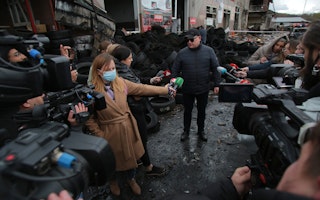Nepali and Colombian Journalists Join Forces to Protect Their Peers
By Ujir Magar

When the peace deal between Maoist rebels and the Nepalese government was signed in 2006, I felt a sense of excitement as I reported it in my newspaper. The 10-year conflict was over and the country was headed towards establishing a federal state. During my recent visit to Colombia I felt similar excitement about the peace agreement—ultimately rejected by the voting public—between the Colombian government and FARC.
Before visiting the country, I assumed journalists in Colombia were affected by the same political and violent conflicts as in Nepal. But this was not really the case. True, many Colombian journalists had been attacked for writing stories on corruption and issues related to collusion between the government and armed groups, including drug lords. But those journalists also have strong organizations protecting them.
In Colombia I learned about the safety mechanism created by the government and civil society to respond to attacks against journalists. Under supervision of the Ministry of Internal Affairs, the National Protection Unit works to provide security to journalists in a variety of ways—for instance, with armed guards, armored vehicles, and relocation services.
But the key to making the protection system effective is the collection, verification, and recording of information about attacks on journalists. This data is collected by Colombian press freedom organization Fundación para la Libertad de Prensa (FLIP) and then provided to the National Protection Unit. FLIP monitors press freedom violations, attacks, and threats, and has a consultative status in the Organization of American States. This membership gives FLIP an opportunity to report violations against journalists on an international level, for example, involving the Inter-American Commission on Human Rights. FLIP has about 30 volunteer correspondents—usually journalists—working in different parts of Colombia.
Similar working methods could also be applied in Nepal. This level of systematization is essential for ensuring that safety measures work. The Colombian protection mechanism is effective, though also expensive.
A former chair of FLIP, Carlos Cortés, in a meeting with Nepali journalists, spoke about the fear he had to overcome to become an independent, responsible journalist. “Any journalist who works on behalf of a political party or group can never be independent and responsible,” said Cortés, adding that he never combined these two things in his career. Security does not come without its costs, however. “It is difficult to do independent, impartial journalism when you move around with bodyguards,” he explained.
In addition, Federacion Colombiana De Periodistas, a coalition of 29 journalism organizations and over 1,200 journalists and media workers, is also enabling journalists to practice their profession freely. It monitors incidents and takes up advocacy work on press freedom issues. I found it to be similar to my own organization, the Federation of Nepali Journalists.
The level of protection for journalists in Colombia is beyond what we can even imagine in Nepal. Yet, after my visit, I am convinced that we can establish a mechanism for the safety of journalists in Nepal. The nationwide network of the Federation of Nepali Journalists and the seven regional offices of the National Human Rights Commission already provide a foundation for enabling the safety of journalists and human rights advocates. A mechanism could ultimately involve all 74 branch offices of the Federation of Nepali Journalists, the human rights organizations in the districts, and the Nepal Bar Association as informants and participants.
Like in Colombia, this mechanism could work to relocate journalists facing genuine threats, and engage in information collection, validation, and risk analysis in collaboration with other state partners such as the police, if needed. This way we can assure media workers are safe and able to engage in independent, fearless, and responsible journalism.
The Federation of Nepali Journalists is a grantee of the Open Society Foundations.
Ujir Magar is general secretary of the Federation of Nepali Journalists.


